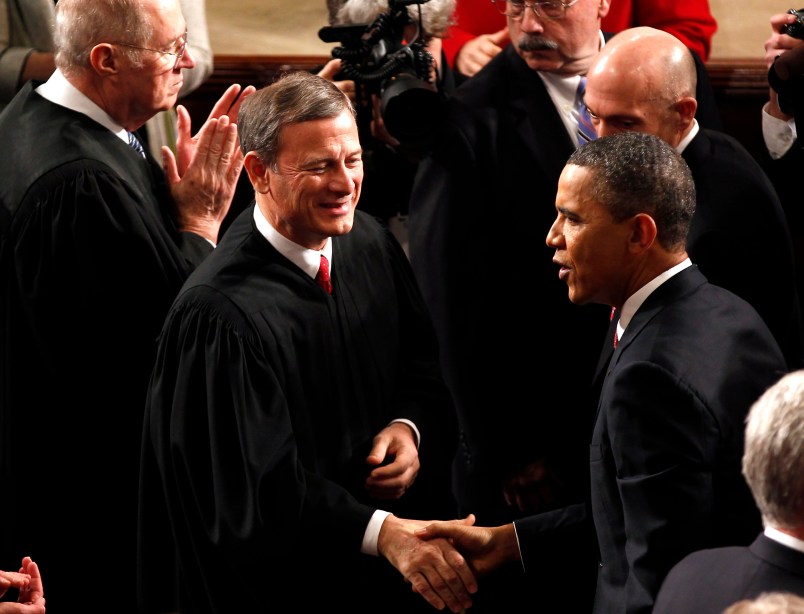Six days after John Roberts cast the deciding vote to overturn a century-old precedent by letting corporations spend unlimited amounts of money to influence elections, President Barack Obama tore into the chief justice — as he sat in the audience — while the nation watched.
“Last week, the Supreme Court reversed a century of law to open the floodgates for special interests, including foreign companies, to spend without limit in our elections. Well, I don’t think American elections should be bankrolled by America’s most powerful interests, and worse, by foreign entities. They should be decided by the American people,” he said during his 2010 State of the Union speech, to raucous applause.
Roberts was, admittedly, a sitting duck. “The image of having the members of one branch of government standing up, literally surrounding the Supreme Court, cheering and hollering while the court — according the requirements of protocol — has to sit there expressionless, I think is very troubling,” he said afterwards. “I’m not sure why we’re there.”
Nearly four years later, the president and chief justice are at odds again over campaign finance restrictions, this time about whether to scrap aggregate limits on individual donations to political candidates or committees. During oral arguments earlier this month, Roberts appeared to be the swing vote, torn between conservatives who seemed inclined to lift those limits entirely and liberals who argued that lifting them could lead to corruption.
On one hand, Roberts voiced skepticism that individual donation limits were constitutional. “The concern is you have somebody who is very interested, say, in environmental regulation and very interested in gun control,” he said, ironically invoking two of Obama’s policy goals. “The current system, the way the anti-aggregation system works, is he’s got to choose. Is he going to express his belief in environmental regulation by donating to more than nine people there? Or is he going to choose the gun control issue?”
But he also expressed sympathy for restrictions on contributions to political committees for the purpose of funneling enormous amounts of money to a single candidate. “I appreciate the argument you are making about the three-point-whatever million-dollar check and the need for the aggregate limits to address that,” the chief justice told U.S. Solicitor General Donald Verrilli. “I understand that point.”
Roberts’ apparent interest in a partial dismantling of the restrictions puts him in an Obamacare-like predicament. The four liberal-leaning justices appeared to want to uphold the law. The three staunch conservative justices, along with often-swing justice Anthony Kennedy, hold hard-line views against campaign finance regulations. Kennedy led the charge for the sweeping Citizens United decision against Roberts’ preference for a more modest opinion, according to author and legal analyst Jeffrey Toobin.
In other words, like with Obamacare, Roberts may be forced to choose between upholding the law with the four justices on his left or tearing it down with the four justices on his right. And like with Obamacare, the president strongly supports the constitutionality of aggregate donation limits and has warned Roberts that his court would be setting a dangerous precedent by overturning it. The chief justice is protective of the court’s reputation and tends to prefer incremental conservative changes to sweeping shifts. After the fierce criticism the Court took over Citizens United, Roberts risks another backlash if he sides with conservatives again.
“The latest case would go even further than Citizens United. I mean, essentially it would say anything goes — there are no rules in terms of how to finance campaigns,” the president said during a televised press conference on the day McCutcheon v. FEC was heard. “There aren’t a lot of functioning democracies around the world that work this way, where you can basically have millionaires and billionaires bankrolling whoever they want, however they want — in some cases undisclosed. And what it means is ordinary Americans are shut out of the process.”
The ideological and personal tensions between the two mild-mannered, Harvard-educated Midwesterners who conquered their respective fields in their 40s dates back to Obama’s Jan. 2009 swearing-in, when Roberts bungled the oath and, embarrassingly, forced the president to take it a second time. Three years later, when Obamacare was in the crosshairs, the president sternly cautioned Roberts and his court that they’d go down in history as nefarious actors if they overturned the law. The chief justice became the swing vote to uphold it on an obscure legal technicality, but he took a veiled swipe at Obama in his majority opinion.
“It is not our job,” he wrote, “to protect the people from the consequences of their political choices.”






